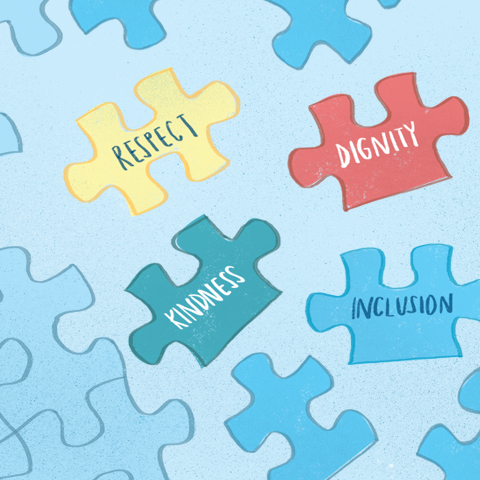
April 2 is World Autism Awareness Day
For many families, enjoying leisure time free of stares, comments, and concerned questions is the norm, something taken for granted. Preparing for these reactions doesn't even cross their minds.
But for eleven-year-old Zach and his family, the feeling of being singled out is a regular occurrence-and something that happens when they're on family outings.
The only difference? Zach was diagnosed with autism when he was five-years old.
"When Zach was smaller, his reactions to over-stimulation could be chalked up as typical, quirky childhood behavior," explains Zach's mother, Darcie. "Now, as a tall and growing young man, people start to take notice when Zach is over-stimulated."
While most people are respectful, Darcie notes that she and her husband get a lot more questions and concerning looks than they used to. These actions, despite their intentions, can have a negative impact on the family.
"Sometimes, it can feel really bad."
For many families experiencing autism, this is the norm. For this reason, Faculty of Physical Education and Recreation Masters of Arts graduate, Kassi Boyd, focused her thesis research on understanding how families experiencing autism experience dignity during community-based family leisure time.
Kassi analyzed the experiences of the family-Mom, Dad, Grandma and Great-Grandma-of Cole, a six-year-old boy with autism, over a four month period.
"It's hard when people try and get their kids away from Cole"
Dignity includes feelings of self-respect and self-worth. And while considerations of dignity may not cross your mind when out in your community, for many families experiencing autism, it is a major concern.
"I wanted to capture the family's experiences of dignity and share their story to create the wakefulness that is needed to be aware of how one's actions may affect other people in community-based settings," says Kassi.
Early experiences of dignity for Cole's family were intricate and multi-layered. Stares, glares and comments made the family feel singled-out and separated from others. The social exclusion experienced left Mom and Dad feeling ostracized, causing them to avoid some activities and places altogether.
"Previous research shows that children with autism experience increased rates of indignity over other children through physical, verbal and relational forms of bullying, often in public settings," says Kassi. "For Cole's family, the way both Cole and his family were treated in community-based settings made it extremely difficult for them to enjoy and even participate in family leisure."
Forget you! We're going anyways
Over time, and as Cole got older, Mom and Dad adopted strategies to help maintain self-respect and dignity for both Cole and the entire family and they refused to let exclusionary reactions stop them from spending time in the community.
One strategy involved preparing Cole to feel comfortable in leisure environments. This involved informing Cole ahead of time where they were going, what they will be doing, who might be there and what sensory stimulus-such as loud noises, large groups or bright lights- might be present in the environment. They also made sure to remind Cole of his coping strategies, which include asking for his noise-cancelling headphones, taking deep breaths or taking a break.
When preparation wasn't feasible or successful, Mom and Dad ignored and rejected hurtful and exclusionary actions of others. These tactics were shared with Grandma and Great-Grandma and together, they stood their ground to create a space for their family in their community.
A little kindness goes a long way
For the families of Cole and Zach, acts of kindness and inclusion play an integral role in creating a sense of belonging.
"It's the moments of genuine responsiveness from people in the community-whether it's Zach's teachers, the ladies at the community hall or a server at a restaurant-that carve out a place of belonging in our community for our entire family," says Darcie.
Cole's parents, grandma and great-grandma felt that acceptance was demonstrated by the community when people expressed a desire to understand Cole. Much like Zach's family, shared time, interest and mutual respect promoted dignity for Cole's family.
"Cultivating practices into our daily lives to ensure dignified experiences for all families in community-based leisure settings is an important step for all community members to take," says Kassi, who plans to continue researching experiences of dignity throughout her academic career.
Kassi hopes the stories shared by both families may provide leisure and recreation practitioners, researchers, families and the general public with insights into creating a sense of belonging for all.
"Sometimes promoting another person's dignity occurs in the simple action of remembering our shared humanity. There is no one recipe for promoting dignity. Rather, the promotion of dignity occurs when people enter into relationship and rely on their shared knowledge as the grounding for ethical action."